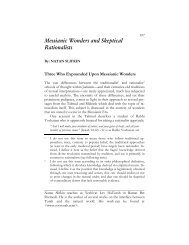Is There a Disconnect between Torah Learning and ... - Hakirah.org
Is There a Disconnect between Torah Learning and ... - Hakirah.org
Is There a Disconnect between Torah Learning and ... - Hakirah.org
You also want an ePaper? Increase the reach of your titles
YUMPU automatically turns print PDFs into web optimized ePapers that Google loves.
40 : Hạkirah, the Flatbush Journal of Jewish Law <strong>and</strong> Thought<br />
me?” or “can it harm me?” And this is so, to the point that he has<br />
to work very hard to remove himself from this self-interest even<br />
when he wants to serve G-d, because his mind <strong>and</strong> all of his<br />
thoughts are aroused <strong>and</strong> moved by his self-knowledge… And so<br />
too should be one’s knowledge of G-d. It should not be a<br />
superficial kind of knowledge that exists alongside other bits of<br />
knowledge that he possesses. Rather, his knowledge of G-d should<br />
enter his soul <strong>and</strong> should unite with his self to the same extent as<br />
his self-interest, <strong>and</strong> it should be with him constantly, be he asleep<br />
or awake, <strong>and</strong> it should arouse <strong>and</strong> move all of his thoughts, that in<br />
all of his thoughts he should recognize Hashem… <strong>There</strong>fore it is<br />
not sufficient to know G-d in thought alone. Nor in learning<br />
<strong>Torah</strong> alone, rather it requires active physical engagement in<br />
the practice of good deeds (emphasis added). For as we have<br />
said, knowing G-d superficially is not sufficient. The knowledge<br />
must enter his soul <strong>and</strong> unite with his very self.<br />
The practice of moral <strong>and</strong> ethical behavior, in a way that<br />
encompasses <strong>and</strong> envelopes the full life experience of the child, as an<br />
individual, as a member of his family, his school, <strong>and</strong> his community,<br />
is thus required if we are to imbue the child with an internalized<br />
intuitive feeling for ethics <strong>and</strong> morality. We manage this well in the<br />
area of ritualistic mitzvos, which are אדם למקום .בין Thus, all of our<br />
children, <strong>and</strong> all of us adults experience an intuitive reaction of<br />
disgust when it comes to treifa meat <strong>and</strong> the like. We pull our h<strong>and</strong>s<br />
away as if from an electric shock when we inadvertently touch<br />
muktzah on Shabbos. And we feel a sense of almost physical<br />
discomfort after having left the bathroom <strong>and</strong> until we find a כלי with<br />
which to wash our h<strong>and</strong>s. We arrived at such visceral levels of<br />
reaction as a result of years of experience with these phenomena.<br />
And these were not merely years of individual experience, but rather<br />
years of communal experience. We watched our fathers <strong>and</strong> mothers,<br />
our gr<strong>and</strong>parents, aunts <strong>and</strong> uncles, rabbis, teachers, mentors <strong>and</strong><br />
friends react to treif, muktza, tum’ah <strong>and</strong> the like, <strong>and</strong> we internalized<br />
those feelings. We developed a “yuk” reaction to treif, to muktza, <strong>and</strong><br />
to tum’ah, <strong>and</strong> we often take pride in these developments. Too bad<br />
that our efforts were, in a sense, misdirected. We developed the “yuk<br />
reaction” for the wrong items.
















